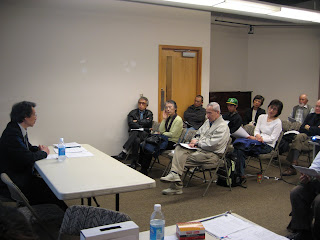すっかりご無沙汰してしまいました。3,4月はイベント続きで、なかなか座って振り返ったり報告を書く暇がありませんでした。長雨の後晴れ上がった週末、やっと本当に春が訪れたかという気持ちです。しかし昨日はすでに街には上半身裸の人たちも歩いていました。バンクーバーでは冬から夏にいきなり直行し、「春」はあったのかな?と思う年が多いですね。

4月12日、日系ヘリテージセンターで、UBC(ブリティッシュコロンビア大学)法学部松井茂記教授 Dr. Shigenori Matsui による日本語講演「日本国憲法 - 改憲は必要か」を行いました。40人ほどの参加者は熱心に耳を傾け、講演後の質疑応答も、九条問題を中心に活発になされました。
多岐に渡る論点を網羅することは難しいですが、主な点を要約します。自分が以前に松井先生から聞いたこと、先生の著書から得た知識などが混ざる可能性があり、「講演でこんな話は聞かなかった」という点も出てくると思います。また、これは松井先生の論点や憲法を巡る議論の私なりの解釈と要約であり、正確でない記述や誤った認識が含まれている可能性があることをご了承いただき、また指摘していただければ幸いです。
- 日本国憲法には改正の限界がある:これ以上変えてはいけないという限界があるという理解が学会では一般的である。その限界として、国民主権がある。主権者は憲法を改正する権利があるが、主権の所在の変更、すなわち、憲法制定権の所在を変更することはできない。現行の日本国憲法は、明治憲法の改正という形式を取ったが、主権の所在が変更している。なのでこれは単なる憲法改正ではなく、革命であったという説(八月革命説)がある。日本がポツダム宣言を受諾したことにより、天皇から国民への主権交代を受け入れ、事実上の革命を起こしたという見方である。
- 憲法改正の必要性として一般的に挙げられている論点をいくつか検証した。
- まずは、日本国憲法は押し付けられた憲法 - 占領下にできた憲法なので「自主憲法」を作るべきだという考え方がある。しかし、ポツダム宣言を受け入れたということは新憲法を受け入れたということである。占領下にできた憲法だからといって自主的な憲法でなかったということはないのだ。当初憲法改正は日本政府に主導権が与えられていた。幣原内閣は松本烝治国務大臣を主任として「憲法問題調査委員会」を発足させる。しかしその委員会が作成した憲法草案は、基本的には明治憲法と変わらず、天皇の統治権は維持するという保守的なものであった。この草案が毎日新聞にスクープされたことを受け、総司令部は日本の新憲法のモデルとなる草案を日本側に提示する。この総司令部案には、日本の法律家や民主的思想家が中心となって作った民間憲法草案が反映されていた。そして約半年間の国会での審議、いくつかの修正も行った上で可決されたのである。以上の点からして、現行憲法を押し付けとは呼べないことは明らかである。
- 上記の点から、日本国憲法は国民を代表する議会が審議して可決したものなので民主的な方法で「押し付け」ではなく決まったと言えるが、やはり政府主導のプロセスであった。「国民憲法制定会議」といった、国民主導で草案を作るプロセスがあったら望ましかったし、日本政府はそういう機会を日本政府から奪ったと言える。
- 戦後60年間の間に一度も改正されたことがない、時代遅れであるという議論がある。単純に、「改正されたことがない」というのは改正の理由にならない。憲法は何十年、何百年も続く法律であり、時代を超えた一般的な原理を定めるものである。時代遅れかどうかという問いについては、個別の条項を検討する必要があり、憲法全体が時代遅れかどうかということを問うことに意味はない。同様に、改憲が必要かそうでないかという議論は、ここの条項がなぜ変える必要があるか、どのように変える必要があるかという議論なしでは意味を持たない。
- 日本国憲法の文言が麗しくないという意見もあるが、憲法は法律文書であるので、美しい文章である必要はない。言葉づかいの文学的評価が改正の理由にはならない。
- 憲法は国のあり方、国柄を定めるべきだという意見があるが、憲法は国柄を定める文書ではない。そのときの多数者が思う「国はこうあるべきだ」という視点を憲法に盛り込むのは危険である。どのような国のあり方がいいのかというのは人によって意見が違う。憲法は、このような多様な意見を持つ人が一緒にやっていけるための手続き文書なのである。
- 改正が求められている個々の条例についてだが、たとえば新しい人権 - 環境権、プライヴァシー権を明記すべきだという主張がある。しかし環境を享受する権利を憲法で保障できるかは疑問である。現行13条で、プライヴァシーの権利は既に認められているので、憲法改正の必要性はない。首相公選制については、国会議員の選挙を通して国民が首相を選出しているので、憲法を改正する必要があるかは疑問である。
- 憲法9条についてだが、自衛のために必要最小限の実力の保持は憲法9条に反しないとの政府の解釈がある。国連の定める平和維持活動(PKO)に参加するのも憲法9条の解釈内で可能であるという政府の見方である。現行9条の解釈で自衛隊の存在とPKOへの参加が認められているのだから、自衛隊の存在とPKO参加が論点である限り9条改正の必要はない。しかし集団的自衛権については現行九条の解釈では行使できないという見方が一般的である。この集団的自衛権 - 同盟国米国が日本国外で攻撃を受けたときに反撃できる権利 - の行使を認めるかどうかが、9条改正をする必要があるかどうかの論議の焦点となっている。
このイベントに準備するため松井先生の著書を読んでいたとき、徴兵についての記述が目に入りました。カナダと日本の二重国籍を持つ子どもの母親としては自然に
松井先生は昨年(2006年)11月に、UBC日本研究センターで英語にて今回のような内容の講演をされました。後日質問をしたときに、「憲法は日本の国柄を定める文書ではない」ということを聞きました。「国のあり方などは人によって捕らえ方が違うのであって、そういった違いがありながらも一緒にやっていけるための手続き的な文書なのだ」ということを聞いて、私は目からうろこが落ちるような思いをしました。日本の「伝統」とか「愛国心」を主張する人たちだけではなく、私自身も、憲法に対して、戦争放棄した平和国家であるという「国柄」の定義を求めていたことに気づいたのです。それが誤っていたと思ったとかそういうことではなく、自分の考えも絶対的価値観ではなく、多々ある価値観の一つであったという相対化が行われたのです。これは、多文化主義を育ててきている国、カナダで12年間暮らしてきた自分にとってもすんなり腹に落ちる見方でした。この考え方を聞いて、松井先生の講演をもう一度日本語でお願いしてもっと多くの人に聞いてもらいたいという気持ちになったのです。
実際は4月12日の講演に対する質疑応答は憲法のあり方についての話よりも、やはり九条に焦点が当たったものになりました。もちろんそれはそれでよかったと思います。
最後に、松井先生も指摘されていた、日本国憲法の総司令部による草案は日本のリベラルな思想家や憲法学者による民間草案がかなり参考にされていたという事実をドキュメントしたテレビ番組があります。NHK ETVで2月10日に放映された「焼け跡から生まれた憲法草案」という番組で、これを録画したビデオを先日関心のある人たちと共に鑑賞しました。関心のある方はご連絡下さい。
質疑応答や寄せられた感想はこの投稿への「コメント」としてこれから追加していきます。
この場を借りて、お忙しい中市民のために講座を開いてくださった松井茂記先生に心より感謝の意を表したいと思います。
松井先生の経歴や研究、著書については先生のウェブサイトで見ることができます。
文責 乗松聡子





